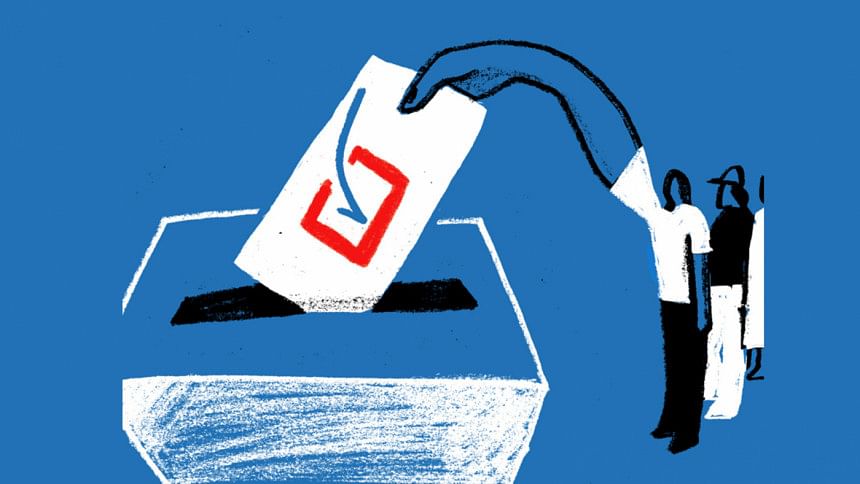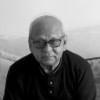Municipal Polls: Tales of Two Candidates

Elections in our part of the world usually generate an atmosphere of festivity among the people. Aspiring candidates start wearing special attire and print posters with greetings on occasions like Eid, New Year and Independence Day as preparations for contesting an election. As the polling date approaches, they become more active. They wear a smiley face, address people very politely whenever they meet them. They print attractive posters seeking votes and visit voters house-to-house posing as their admirers and close friends. They organise processions and public meetings in support of their candidacy.
The candidates promise to build roads, bridges, schools, colleges, water supply systems, sanitation and draining facilities… basically anything conceivable for the benefit of the voters. They open temporary offices where they entertain prospective voters with tea and cigarettes. For most party workers, it is an opportunity to earn a few bucks as the candidates pay them handsomely for their services. Needless to say, electioneering in our country has become an expensive affair. As a result, mostly the rich people can afford to contest elections.
Even in festive moods, untoward incidents also do occur during elections. There are occasional clashes between rival candidates and their supporters, often resulting in injuries and even deaths. Occasionally, polling agents are driven out of the polling centres on the election day by supporters of the rival candidates. Thus we see both money and muscle play decisive roles in most elections in our region. As a result, honest people who have no money or muscle power hardly get an opportunity to contest the elections.
A similar situation is now prevailing in the ongoing municipal elections in Bangladesh, perhaps with very few exceptions. Two stories will illustrate this point. First, it has been reported that a candidate named Jamal (not his real name) recently contested in a municipal election for the position of councillor but failed miserably. Out of frustration, he went to a pond close to his home early in the morning and dived seven times in the cold water. While diving, he was holding his ears with his two hands in front of the media and some local people. After each dive, he shouted loudly, "I promise I shall never contest any election."
Later, he explained his reasons. He said: "I am an honest man and I wanted to serve my people sincerely. I became a candidate hoping that the people would vote for me because of my honesty and sincerity. Initially, everybody in my locality supported me. I thought I would easily win but a day before the election, the whole scenario changed dramatically. All my supporters deserted me because a rival candidate bought all of my supporters by paying them handsomely. Consequently, I lost to him. Now I have realised that no honest person can win any election unless he also spends lavishly on buying votes. So I promised never to contest any election in the future, and I would advise all honest people to do the same."
Knowing the present culture of elections in our country, this story seems to be authentic and it terrifies us. If all honest and sincere people take Jamal's advice seriously and abstain from contesting future elections, what will be the character of public representation in our country? What will our leaders deliver to the people if only candidates with money and muscle power are elected to hold important positions in local bodies and parliament?
Now here is a different story to indicate that the future may not be as scary as depicted above. It has been reported that one beggar was contesting an election for the councillor position in a municipality. Let us call him Zahed, not his real name. He is a real beggar in the sense that he actually begs for alms. Irony is, during elections, all candidates beg for votes but we do not call them beggars! Zahed was a day labourer during his early life. He is now 70 years old and unable to work. So he became a beggar to meet his family expenses. He organised other beggars in his locality and formed a Beggars' Association of which he became the chairman. (Begging, by the way, is not a respectable profession and should be discouraged. Some people are, however, forced to beg as there is no effective and comprehensive system to rehabilitate them.)
Zahed is well-known as an honest person. His fellow beggars inspired him to contest the election. Initially, he was hesitant as he had no money to contest the election. The people in his locality came to help him. They contributed whatever they could to meet his election expenses. Tk 100, 200 or 300. His wife also came to his aid. She prepared tea for his supporters who came to visit him. He reportedly became a popular candidate. His arguments were simple but very convincing. He said that he was a beggar and he had been poor all through his life. So he understood the sufferings of the poor people which no well-to-do candidate could. Marginalised people like Zahed live in slums in very unhygienic conditions without proper roads, sanitation, water supply and drainage systems. A candidate like him is thus better suited to solve their problems.
Zahed's candidature is a unique case in our country. He had no money and no muscle power and yet he was contesting an election with the support of fellow beggars and the local people. To say the least, this is democracy in its best form. It is not known if he won the election but his candidacy itself is a giant step forward toward the empowerment of the marginalised people. One can only hope to see more candidates like him in future elections, both at local and national levels.
According to one estimate, most of the current members of our parliament (over 61 percent) belong to the business community. The voices of the marginalised people are, therefore, rarely heard in parliament even though they form the vast majority of our population. Their problems and grievances remain mostly unresolved. Their voices will be louder if marginalised people like farmers, day labourers, domestic workers, garment and factory workers and rickshaw pullers find their way to all public offices in our country. Surely they can do this if they can unite and organise themselves, like the supporters of Zahed. Their journey to power may be long and arduous but if they can accomplish this, they will be a major driving force to realise Bangabandhu's dream of emancipation of the downtrodden people of our country.
Dr Abdul Matin is a retired nuclear engineer and former Dr. Rashid Chair Professor of BUET.

 For all latest news, follow The Daily Star's Google News channel.
For all latest news, follow The Daily Star's Google News channel. 



Comments